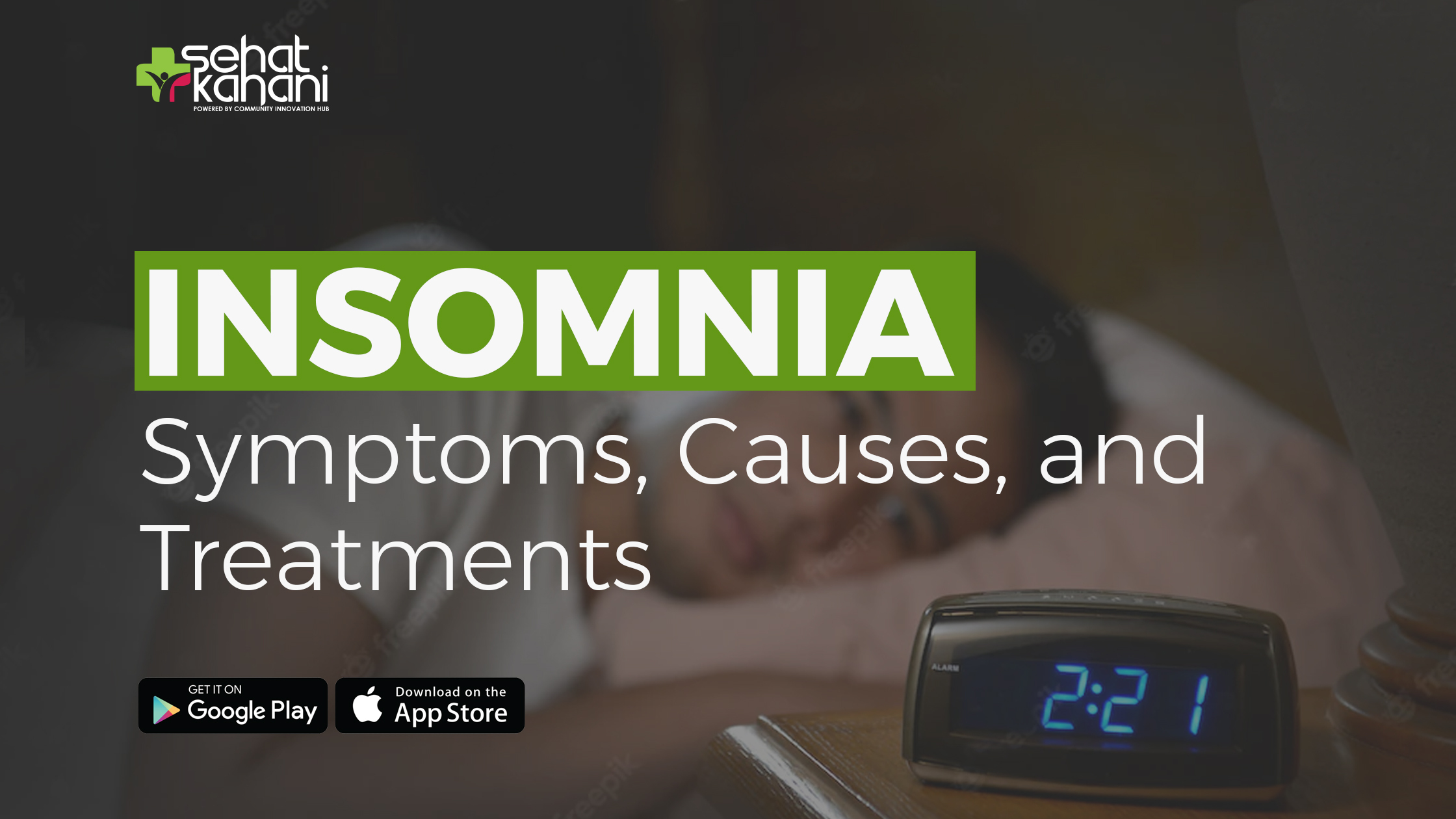
Introduction
To be able to sleep on time is a blessing. Proper sleep is crucial for the optimal functioning of the body. Around 35% of people experience difficulties in falling asleep or staying asleep. This can not only make you feel tired and grumpy the next but can cause noticeable problems and hindrances in your everyday errands.
The following blog contains a detailed account of what insomnia is, what are its types, symptoms, causes, and treatment options. We will also try to educate you about the preventive measures you can take to prevent insomnia if you are at risk.

What is insomnia?
Insomnia is referred to as a sleeping disorder in which the individual can’t easily fall asleep and even if they do, they can’t stay asleep.
Insomnia can be acute (short-termed) ranging from one night to a few weeks or chronic (long-lasting) persisting at least three nights a week for three or more months.
Insomnia is also classified as primary and secondary insomnia. Primary insomnia is when the condition is not linked to any other health alignment. Whereas, secondary insomnia is due to the disturbance in sleep due to some other health issues. Conditions causing insomnia include cancer, heartburn, depression, arthritis, and asthma. Substance use can also trigger secondary insomnia.
What are the common symptoms of insomnia?
Insomnia has multiple symptoms which you not only experience at night but during the day as well. The symptoms observed at night include;
- Difficulty in falling asleep
- Inability to stay asleep
- Waking earlier in the morning without any reason or cause
- Delay of more than 30 min to sleep
- Staying awake for 30 minutes or more during the night
Children and teens can also develop insomnia. Insomniac youngsters tend to resist sleeping at their usual bedtime and require extra care from their caregivers to sleep.
The symptoms of insomnia observed during the day include;
- Mental confusion
- Impaired attention
- Tiredness
- Compromised performance at school or work
- Hyperactivity
- Decreased motivation
- Sleepiness
- Irritability and bad mood
- Aggressiveness
- Increased mistakes
To confirm the diagnosis of insomnia, it is important to assure that both the day and night symptoms are occurring in a normal environment and are not a result of another sleep disorder, disturbance during sleep, or a lack of sleeping opportunity.
Medical attention is required when your difficulty to sleep is causing impairments to your daytime activities. Remember not to self-diagnose yourself with insomnia just by noting the symptoms as they might also represent some other sleep disorder. Work with your doctor to ensure a proper diagnosis.

What causes insomnia?
In most cases, insomnia is accompanied by other diseases and conditions, especially in the case of chronic insomnia. Insomnia can be resolved by treating the underlying problems. However, it is a time-consuming process and can take up to years.
The most common causes of insomnia include;
Disturbed sleep cycle
Your body works on an internal clock that guides itself to wake up and sleep at a specific time. This creates a pattern called circadian rhythms. This rhythm guides the sleep-wake cycle of the body along with metabolism and basal body temperature. Not sleeping and waking at a regular and decent time disturbs this cycle which can lead to insomnia.
Late-night heavy meals
Having the habit of heavy dinners can also aid in the development of insomnia. Eating too much before bed can lead to discomfort and can cause heartburn, which hinders your sleep and cause insomnia.
Stress
Stress about work, finances, studies, or loved ones can keep your mind active at night. People in their post-traumatic phases are also prone to get insomnia.
Poor sleeping habits
Not having a regular time to sleep, an uncomfortable sleeping environment, and disruption at night are some of the poor sleeping habits which can cause insomnia. Taking naps during the day and having too much screen time, especially before bed can also disturb your sleep cycle. Another common poor sleeping habit is using your bed for work as this can keep your brain awake and alert in bed and disturb your sleeping patterns.
Increased caffeine, alcohol, and nicotine intake
Tea, soft drinks, coffee, and other caffeinated drinks give your brain a type of boost and thus are labeled as stimulants. Consuming stimulants in the evening keeps the brain awake and can lead to insomnia. Alcohol may help you to sleep but is harmful to your sleep cycle in the long run as it can cause interrupted sleep.
Mental health conditions
Having mental health conditions can have a toll on your sleep cycle. Depression, PTSD, and anxiety usually affect the sleep cycle of individuals making them an insomniac.
Restless leg syndrome
This condition causes unpleasant sensations and the urge to move your legs. This condition is more severe in the evenings and especially at night. This involuntary movement of the muscles of the legs keeps people stay awake during the night.
Sleep apnea
Sleep apnea is a condition in which the individual experience repeated starts and stops in breathing. Loud snoring and feeling tired even after a full night of sleep are the common symptoms of this condition. Sleep apnea is another key disorder causing insomnia.
Medications
Various medications tend to disturb your sleep cycle including blood pressure medications, antidepressants, anticonvulsants, and asthma medications. Other medications which contain caffeine or steroids also cause insomnia. Even some common allergies, pain, and cold medications can also disturb your sleep.
Other diseases
Various chronic diseases may also lead to insomnia. The most common ones include heart conditions, asthma, GERD, Alzheimer’s disease, Parkinson’s disease, thyroid issues, chronic pain, cancer, and diabetes.
Aging
Old age brings a lot of challenges and changes in sleep problems are one of them. Aging disrupts your sleep cycle and you get more sensitive to noise and environmental changes. Even slight noises wake you up. Unfortunately, the majority of aged individuals suffer from chronic mental and physical conditions including back pain, arthritis, anxiety, and depression which tend to keep them awake at night. Even if they sleep, bladder problems, sleep apnea, and restless legs syndrome disrupts their sleep. Decreased activity, added number of naps during the day, and medication use also interfere with the quality of sleep at night.
What are the treatment options for insomnia?
There are many treatment options available to get rid of insomnia but the initial focus of healthcare providers is to figure out and fix the primary disease which is causing insomnia. Following are some major ways in which insomnia can be treated.
Cognitive behavior therapy
Cognitive behavior therapy can be used for the treatment of insomnia by exploring the connection between our thinking, and our actions, and how they affect our sleep. The treatment is also called CBT-I treatment in which the healthcare provider helps the patients to identify their thoughts and actions and be more mindful of how these things can affect their sleep at night. The provider also works to correct your misconceptions about sleep which helps to remove sleeping challenges.
Exercise
Exercising is good for your overall health and can also help you in improving your sleep quality and patterns. For better sleep, workout sessions should be incorporated during the day. Aerobic exercises can greatly help insomniacs and can appear to create a similar effect on the body as that of sleeping pills. However, there is more research required to check the compared effectiveness.
Relaxation therapy
Stress and anxiety are some major causes of insomnia. To overcome that, relaxation therapy can be used. Deep breathing, meditation, hypnosis, and tensing and relaxing of different muscle groups are some of the features of this therapy.
Sleep restriction
Sleep restriction is also named paradoxical intention therapy. The therapy mainly focuses to shape your mind in a way that you only associate your bed with sleeping. The therapist will help you spend less time in bed and restrain from doing any other activities, especially work, on the bed. Changes in the duration of bedtimes also create a state of minimal sleep deprivation which further helps in improving the quality of sleep.
Stimulus control therapy
Various stimuli wake your brain up and can delay sleeping. Such stimuli include bright lights from phones and television, loud noises, heavy meals, caffeine, and alcohol intake. People with insomnia should limit their exposure to these stimuli, especially at night. Avoiding extreme temperatures in your bedroom can also help you sleep better.

How can you prevent insomnia if you are at risk?
Having stress, mental health issues, and even genetics can put you at risk of developing insomnia. If you are someone at risk, then you should be more mindful of your sleeping habits. You should work to promote sound sleep. Following are some ways you can prevent insomnia;
- Try to maintain a constant bedtime and wake-time every day, both weekdays and weekends
- Increase physical activity during the day to promote sleep
- Examine your medications to discover if any of them might be causing your insomnia
- Avoid napping during the day
- Limit or avoid using alcohol and caffeine, especially in the evening
- Avoid having heavy meals and drinks before bedtime
- Quit using nicotine
- Avoid working or other activities in your bedroom and reserve it for sleeping only
- Make your bedroom more comfortable
- Create a bedtime routine to relax, opt to read, warm baths, or soft music
If you are someone struggling with insomnia, consult Sehat Kahani’s expert psychologists and psychiatrists. Using their expertise and extensive experience, they will help you sleep better and more comfortably.




